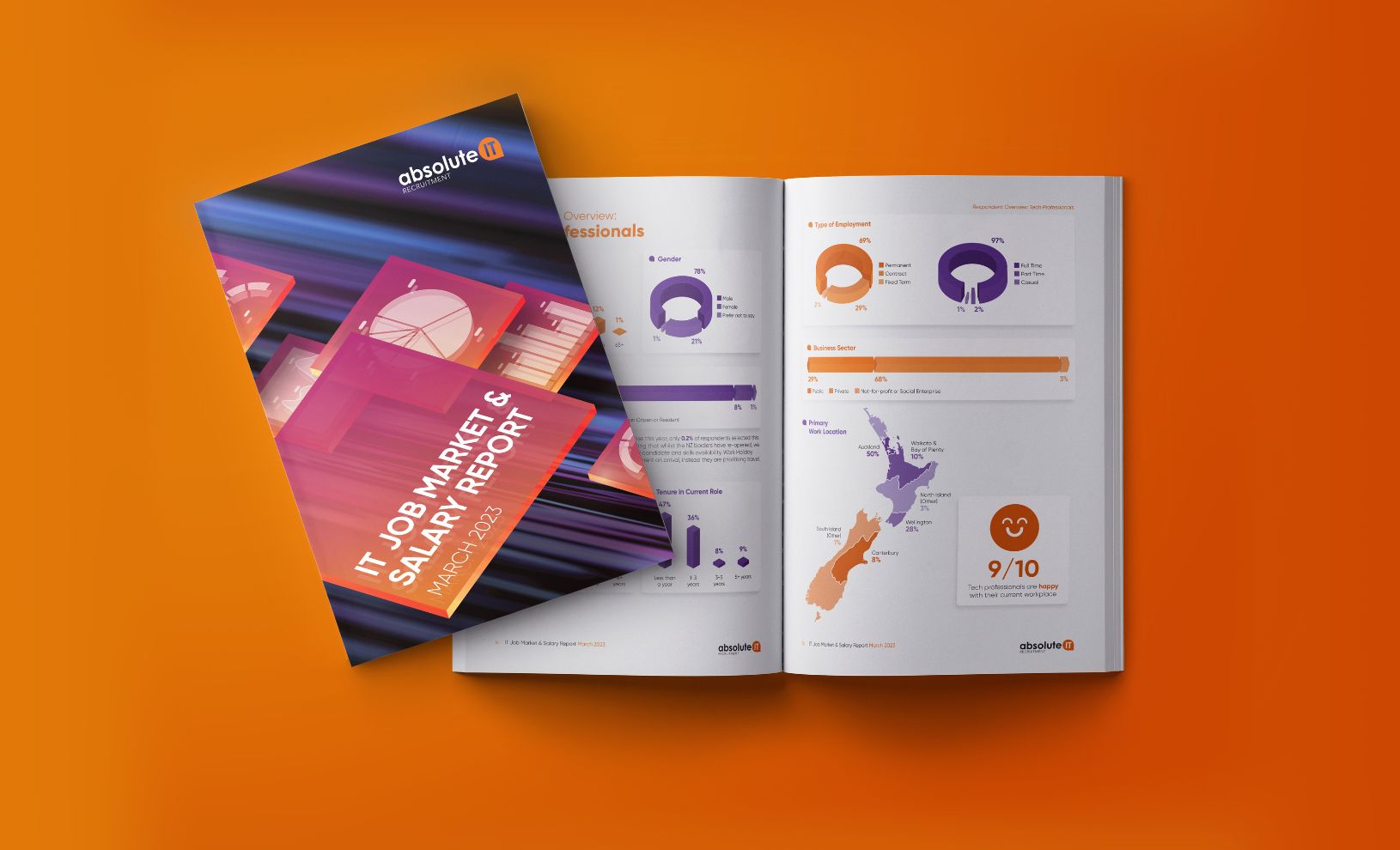If you want to ace your tech job interview, building rapport is key. One of the biggest challenges for professionals in interviews is how to balance professionalism while being relaxed and authentic. The more the interview feels like a natural conversation, often the better it will go. If you’re an IT professional looking to improve your interview experience, this article’s for you. We’ll explore ten ways that you can build rapport naturally to help you succeed in your next interview.
1. Email and phone conversations ahead of the interview
Building a professional relationship with a hiring manager starts before you even enter the room. There may also be others you are speaking with beyond a main manager – it’s quite common in IT for a senior developer or other technical role to be in the room as well to specifically gauge hard skills or ask technical questions.
Prior to the interview, you can use email and phone calls to build some initial rapport. This could be sharing some of your experiences, asking some questions about the team and the work, or even general reflections on the industry. Present yourself as an insightful colleague, not just a resource.
You’ll find that with some pre-meeting communication the time to break the ice in person could be reduced. There’s no need to over-do this; simply let the flow of communication translate some of your personality and not solely facts about your fit for the job in question.
2. Be honest and open
If you can remain open and honest in a job interview, you’ll have less to remember and have a smoother conversation. But it doesn’t mean you shouldn’t think about how to convey information effectively and share the most relevant things. Honesty in an interview is about being upfront with your motivations for applying, the parts of work you enjoy and don’t, and things you want to know more about. It’s also a matter of being open about who you are, not who you think the panel expects you to be – after all, they’ll learn who you are genuinely anyway if you get the role.
Any employer who wants to build or maintain a great work culture will prefer candidates be open with their skills and their personality. It takes all sorts to build a diverse, talented team, so be yourself and answer questions honestly. It’s in your best interests that the conversation is open and both parties get the most accurate sense of person-job fit. Without this, there’s the risk of getting into a role that’s actually not the best choice for you.

3. Address everyone in the interview
Many job interviews include a number of people, sometimes called a ‘panel’. While it might feel natural to just talk to one person, we’d encourage you to actively address each person. That means looking at each of the panel in the eye as you answer questions, especially those that demand a longer answer. If you get a sense of what areas of your experience are most important to each of the team, you can tailor your focus of conversation accordingly.
Addressing everyone doesn’t mean spending equal time communicating with each individual; typically, one person will lead the interview and ask the majority of questions. Some interviewers will ask their colleagues some questions. Regardless of how much involvement they have in asking you things, we’d encourage you to find ways to involve them. You can do this by asking them questions specifically, such as a technical question to a senior developer about the systems architecture. It may seem minor, but this effort will be noticed by the interviewer.
4. Don’t be afraid to share things about yourself
A job interview is about both sides finding out about the other to determine fit. With workplace culture being such an important part of managing staff attrition and team motivation, employers want to learn about you as a person beyond the skills and experience you have. While it’s important to illustrate why you’ve got the tools to thrive in a job, make sure to find opportunities to build rapport by sharing a bit more about who you are outside of work.
Not sure where to start? Some common go-tos are your family, where you grew up, went to school, past travel, your hobbies, holiday plans and even personal development. You know best what to share in the interview, but even a small conversation about yourself can help open everyone up and create a more relaxed atmosphere.
5. Ask questions about the project, team or business
You’ll likely have heard the advice of ‘asking questions’ in the interview, but it’s not simply a matter of asking any question. This is an opportunity to learn more about the job and team, as well as demonstrate genuine interest in what you’ll be doing. Before the interview, jot down 4-5 questions about the business, team or active project that you’d be helping with. Make sure these are questions that you’re actually interested in learning the answer to.
You can bring a notepad to the interview to capture notes on the answers to your questions. You might hear something that warrants follow up later via email or phone – another opportunity to show your engagement and interest in the role.
6. Be willing to adapt your responses based on what you hear
If you have limited interview experience, adapting on the fly can be challenging, but it’s a worthwhile effort for a more natural and successful interview. Preparedness is important – come with scenarios, skills, challenges and experiences you’ve acquired to help answer questions in the interview. Of course, it’s unlikely that every question will align perfectly with your readiness.
Be willing to pull from other past experiences or cover skills outside of those you’d prepared for. The conversation may also move into an area that you’ve got thoughts on but hadn’t previously considered in your preparation – be willing to provide your view, even if you need a moment to consider.
Adapting and adjusting your approach is a skill that improves over time. Remember to actively listen, and avoid relying on heavily-rehearsed responses that don’t fit the conversation, as they can hinder rapport-building with the interviewers.
7. Show you’ve done your homework
In our experience working with both employers and IT professionals, we can safely say there’s a huge benefit in candidates who’ve read up on the business they’re interviewing for. This doesn’t need to be a major undertaking either. Simply jump online and read about the organisation, check out their social media, ask around your network – easy steps that will help you build an idea of what the employer does, and their values.
Demonstrating this in the meeting can be dropped in naturally to responses and questions you ask. For example, “I noticed on the website that you work with non-for-profit clients. Was there any difference in how you engage these clients and others?”. It can be even more nuanced, such as referencing a skill or value that the employer pushes in their website or public comms and how you hold a similar value (and how you’ve applied it in the past).
Doing your homework doesn’t mean you have to memorise everything. Taking notes and bringing these in shows this homework and effort put into a good interview. You’ll notice how much this foundation of respect fosters better communication and rapport building.
8. Share views on the tech industry
The conversation doesn’t have to focus solely on the employer or yourself. Sometimes it’s valuable to share thoughts around the IT industry as a whole; emerging technologies, current trends or events or even the job market. These sorts of discussions help everyone get a sense of each other’s perspective – and set outside the dynamic of interviewer and interviewee.

9. Be honest about gaps in your knowledge – and confident in your strengths
No one’s perfect for a role. With enough digging, any IT professional will have gaps in their experience or knowledge. An IT employer’s objective is to find someone that best fits what they need. As a candidate you can build plenty of trust by being forthcoming about areas you’d like to improve in or where you’d need some training. On the flipside, don’t be shy about talking about the areas you’re particularly good at or confident in. While humility is valued in New Zealand work culture, building rapport through honesty means being open about both your strengths and areas for improvement.
10. Share your immediate reflections at the end of the interview
After the interview you can give some immediate feedback on how you thought the meeting went. This doesn’t need to be overdone – simply sharing that “I really enjoyed the conversation” is effective enough for reinforcing that you’re interested in exploring the opportunity further. If there were things you weren’t so sure about then feel free to air these. You might have simply misconstrued something that can be quickly put to bed there and then.
Learn more about New Zealand’s IT industry
If you’re interested in reading more about our tech sector, head over to the Absolute IT blog where you can find insights about a range of topics including job interviews, CVs and personal skill development.
Explore our available IT roles today
Are you looking for a new IT role, perhaps one in which you can enjoy a flexible working arrangement? Check out our latest jobs to potentially find your next big career move.









